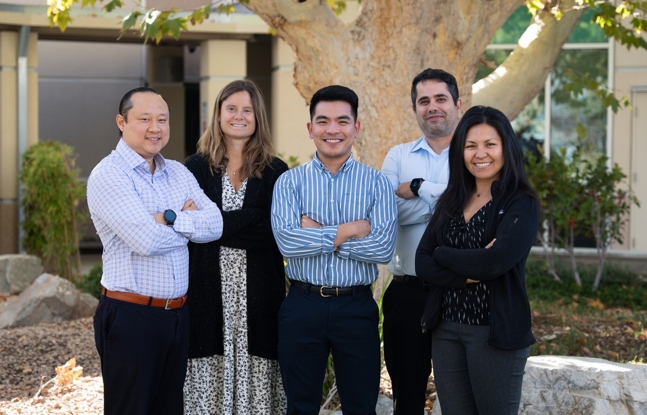RRH training builds culture of competence, empathy
- Category: News, Press Releases, Blog
- Posted On:
- Written By: Rebecca Neipp

“Though we face a lot of unique healthcare challenges because of our rural location, our nurses and providers work hard to be a trusted resource for supporting the people of Ridgecrest.” David Foster, whose credentials include a master of science degree in nursing, shared how his role as clinical nurse educator at Ridgecrest Regional Hospital has given him insight into how the investments into new equipment and dedication of the staff have improved the staff culture and patient experience at RRH.
“Living in a rural community, our healthcare providers bear the burden of needing to be specialized in a wide variety of patient conditions and needs that would normally be met by a much larger staff,” said Foster.
Our hometown hospital has continued to grow and evolve over the years, weathering changes in healthcare regulations, reimbursement systems, earthquakes, economic shifts, and recruitment and retention challenges.
While the pandemic era was a microcosm of those uncertainties, it was also a time when the RRH education team began to invest in innovative methods and equipment for training.
The modernized simulation lab allows professionals to practice skills and techniques under close observation and real-time feedback can facilitate safer, more efficient healthcare delivery.
“From the perspective of an educator, technology has changed how we train people, how we study and improve our practice, and how we implement the lessons learned from our research,” said Foster. “By providing our local staff with the resources to continue expanding their knowledge, we empower them to go above and beyond what is normally expected in patient care.”
The new “sim lab” provides opportunities to run drills and practice scenarios that are rare, but could still crop up in a rural setting. “This ensures our patients not only receive the best possible care, but our staff develops skills they can be proud of.”
This imperative to keep skills sharpened was of great use during the 9 months suspension of labor and delivery at RRH during 2024.
Although most expectant mothers were re-routed to hospitals in neighboring communities, 15 babies were delivered at RRH under emergent circumstances.
“We are incredibly fortunate to have such a dedicated staff, as well as a team committed to helping every one of our nurses and providers keep their skills sharpened. Being prepared for the unexpected is just a part of healthcare, and our staff works hard to be ready for it,” said RRH CEO Jim Suver.
“When I'm training nurses here at RRH, I am training them to take care of me and my family, too,” said Foster, who is one of hundreds of individuals employed at the local hospital who grew up here and returned to give back to their community.
“Having been born and raised here in Ridgecrest, I see the needs of our community and I do my best to make sure our staff is prepared with the knowledge and skills necessary to care for the residents of a town I care so much about,” he added.
Foster attended Burroughs High School in the early 2000s. During his junior year his counselors and teachers prompted him to give serious consideration to a potential career path. His parents helped him identify some paths that aligned with his values — one of which was to make a contribution as a leader and a role model in his community.
“With so many options, it was hard to choose,” he said. Fortunately, he was allowed to shadow several different professionals — including nurses, physicians, respiratory therapists and hospital administrators — during his Health Careers class, as part of the career technical education program.
“I learned so much about the different responsibilities and how each role contributed to restoring people to their best health,” he said. “This experience helped me find the right nursing program for me and get on a career path that ultimately led me back to my roots in healthcare and giving back to my community.”
He has worked in both clinical and technological aspects of healthcare delivery, and being a clinical educator allows him to combine both of these passions. “I get excited to teach others information that will empower them to help themselves, and others, have better lives.”
Some of these trainings, such as CPR, can bring someone back to life, or keep someone alive when their health is rapidly deteriorating. There can be fear and uncertainty when facing such a critical need. “It's incredibly fulfilling to see our staffs' confidence grow in these situations.”
During a simulation, one of the smart manikins can manifest symptoms relating to irregular breathing, fever, heart rate, spasms, and other clues that can help providers identify patient needs.
These sessions also focus on consent and empathy, helping professionals create a bond that will facilitate better patient outcomes, encourage treatment adherence, and help reduce staff burnout. Early in his career, Foster adopted the “Jean Watsons Caring Science” model of nursing, which includes 10 guiding principles for patient care.
“One of my favorite quotes from Watson is, 'Maybe this one moment, with this one person, is the very reason we're here on Earth at this time.' When we have empathy for others who are trying to heal, they have the space and the support from me to safely do so.”
That empathetic focus, coupled with the modern technological setting for training, gives providers and nurses a chance to utilize their critical thinking and training to respond to critical scenarios like codes or trauma care in a low-stakes environment, “so they are better prepared to care for members of our community in similar situations,” said Foster.
He encouraged community members — whether or not they are considering a career in healthcare — to take a CPR class. “It would be one small way for each of us to make a difference in our community.”
.jpeg)

